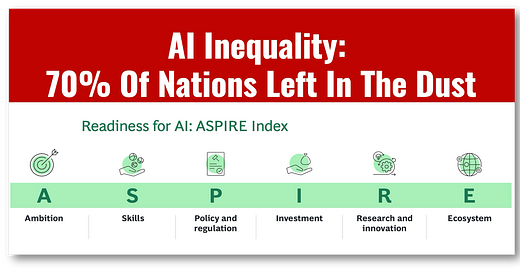AI Inequality: 70% Of Nations Left In The Dust
Will AI's dubious legacy be increasing economic inequality?
BCG looks at 73 nations' level of AI readiness and finds that more than 70% are falling behind in AI and don’t have the ecosystem, skills, or R&D to compete.
This may come as a shock to those who believe the hype that AI will be the savior of humanity. In reality, AI will be the savior of the few nations that can harness its power, and everyone else is left in the dust.
AI is “general purpose technology,” foundational to growth in our new world, and a big part of the world is being left out of the revolution. This dilemma isn’t new; the steam engine was once a high technology limited to advanced nations that became colonial powers.
AI’s problem is that, like the steam engine before it, it may exacerbate inequality between nations, which is a dubious legacy if there ever was one.
👉TAKEAWAYS
🔹 Most economies in the study are not ready for AI disruption. More than 70% score below the halfway mark in categories like ecosystem participation, skills, and R&D. Policymakers must act now to adjust to a world of AI and boost resiliency, productivity, jobs, modernization, and competitiveness.
🔹Out of 73 economies assessed, only five—Canada, Mainland China, Singapore, the UK, and the US— are categorized as AI pioneers. They have reached a high level of readiness by blending elements like investment and infrastructure, turning disruption into a competitive edge.
🔹Nine economies with high AI readiness are just behind the pace of AI pioneers. While this group of AI contenders includes established economies, it also features emerging ones like India, Saudi Arabia, and the UAE that are using policy and targeted investments to adopt AI on an advanced level.
🔹The three most AI-exposed economies in our study are Luxembourg (with financial services making up almost 30% of GDP), Hong Kong (22% financial services and 22% business services), and Singapore (18% business services; 16% retail; 14% financial services).
👊STRAIGHT TALK👊
We live in a much smaller world than during the Steam Era, and AI inequality won’t just stop at a national boundary.
If AI appreciably increases the economic gap between nations, it will be everyone’s problem, not just that of the countries left behind.
If this sounds ominous, it is. Inequality is widely considered to be at the root of many global problems, including social unrest, political instability and economic stagnation.
If AI increases inequality, don’t be surprised by the results. Perhaps we should be glad it hasn’t delivered any tangible economic gains so far!
If you still have any doubt, listen to the rhetoric in the tech war between the US and China to better understand AI's role as a king-maker.
AI is a serious business, and AI inequality will be a significant global trend.
Please share on Substack with a restack!
Readers like you make my work possible! Please consider a paid subscription or buy me a coffee. Your contributions support independent writing that is beholden to no one! Thank you!
Sponsor Cashless and reach a targeted audience of over 55,000 fintech and CBDC aficionados who would love to know more about what you do!









